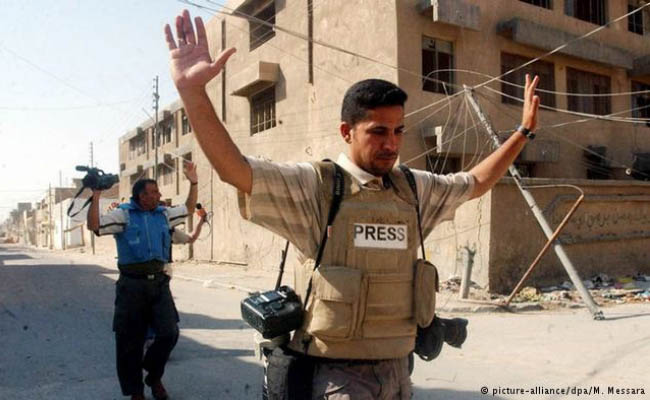Despite significant improvement in freedom of speech in last 15 years, Afghan journalists have been facing serious threats and challenges imposed by insurgent groups while the local authorities also blamed for the climate of fear for media personnel. As a result, many of Journalists in Afghanistan abandon their jobs or continue their work under extremely difficult circumstances and routinely face violence, threats, and intimidation that prevent them from carrying out their work freely. According to the recent report released by the Afghanistan Journalist Safety Committee (AJSC), the year 2016 was the deadliest year for journalists in last 15 years. According to the report 13 journalist killed, 6 were wounded during the year, while they also documented, "30 cases of beating, 35 cases of intimidation, and 17 cases of abuse and mistreatment." With 101 cases in total, the year saw a spike of 38% in instances of violence against journalists compared to 2015, with 50.5% attributed to the government of Afghanistan, while the Taliban accounted for 22.8%. Most of the remaining cases were attributed to unknown individuals. "An increase in the level of threats and attacks against journalist and media by the Taliban has not only transformed the nature of the threat environment, but also forced extensive self-censorship on journalists who work in the insecure areas of the country," the report said.
In addition to this, Earlier a similar report had been released by Nai, an organization supporting open media in Afghanistan, 14 journalists were killed while 23 were injured, 43 were beaten and 337 received death threats in 2016.
This increase in violence against journalists has turned Afghanistan into the second most dangerous country for journalists in the world, after Syria," Najib Sharifi, the chairman of the committee, told reporters on last Thursday. The report noted that a shift in the Taliban's policy towards the media was the "main driver of the increase in the level of threats and deadly violence against journalists". In January last year, seven employees of popular TV channel Tolo, often critical of the insurgents, were killed in a Taliban suicide bombing in Kabul in what the militant group said was revenge for "spreading propaganda" against them. It was the first major attack on an Afghan media organization since the Taliban were ousted from power in 2001 and spotlighted the dangers faced by media workers in Afghanistan as the security situation worsens amid a growing wave of militant attacks.
May of national and international actors expressed concerns over increasing violence against journalist calling 2016 the deadliest year and the second most dangerous for reporters in the world after Syria. "Freedom of the media is the key to any democracy and transparency in society and gives ordinary Afghan citizens a voice,” said the European Union special representative. Ambassador Franz-Michael Mellbin urged all parties to the conflict to do their utmost to protect journalists and provide them with a safe and secure working environment. "It is alarming that the government continues to be responsible for so many cases. The government should do its utmost to bring perpetrators of threats, attacks and killing of journalists to justice. Attacks on the media must be stopped", said Ambassador Mellbin.
The Direct attacks on journalists are against national and international laws and values; they do not only limit the ability of journalists to collect accurate reports from the conflict fields but also force them to find a safer job. The AJSC blamed the deaths of at least 10 of the 13 journalists on the Taliban, saying the group had "drastically increased" it is targeting and intimidation of journalists, leading in some cases to more self-censorship by media.
In June 2016, American journalist David Gilkey and his Afghan translator were killed in a rocket attack by the Taliban in southern Helmand province. But the report also noted that the majority of violent incidents against journalists were carried out by government forces, with the European Union criticizing the "alarming" trend."The government should do its utmost to bring perpetrators of threats, attacks and killing of journalists to justice," the EU delegation to Afghanistan said in a statement. According to AJSC figures, 28 journalists and media workers have been killed in the past five years in Afghanistan.
These waves of violence and social outcry follow the approval of access to information law created hopes for journalists and other citizens as a great milestone towards democracy development in Afghanistan. The paradoxical increase of violence has again fuelled tension and frustration between journalists and civil society. As many governors and local officials do not respect journalistic independence. Journalists have been harassed or come under attack by local officials, their bodyguards, police officers and the Taliban in several provinces. The police and judicial authorities, who are susceptible to being influenced by governors, often interrogate and even punish journalists.
In democratic system media considered as the fourth pillar of a government; According to international conventions to which Afghanistan is a signatory and according to Article 50 of the Afghan Constitution, “Right to know” or “Right of Access to Information” is a fundamental human right for every Afghan citizen. It can play an important role in the fight against corruption and the right to access information increases transparency, accountability, public participation and democracy development. So, it is expected that human right orgs and local citizens strongly support media and journalist to monitor social, political or administrative issues or else a nation of sheep will beget a government of wolves. At least, it is possible to enhance media by new media such as mobile phone, face book and etc.

